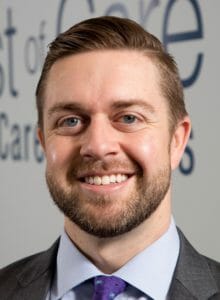

The last 19 months have been filled with many unknowns, and healthcare has been forever impacted because of it. The COVID-19 Delta variant is creating continued challenges, filling ICUs and hospital beds at a time when many had assumed the worst was behind us.
Vaccinations must increase – especially among direct care workers – to help combat the spread. Unfortunately, misinformation and judgment surrounding the vaccine have made it difficult for even healthcare workers, who protect our most vulnerable populations, to make informed decisions regarding their own vaccinations.
Legislators and industry leaders agree it is vital for healthcare workers to be vaccinated, especially those in direct care; however, senior care providers – those who are the most likely to interact with high-risk patients – are reportedly the least likely to be vaccinated.
Federal, state, local and workplace vaccination mandates are increasing and are pushing this challenge to the forefront at a time when healthcare executives are concerned about both rising COVID cases and staffing shortages. Vulnerable populations are once again at high risk, including those with in-home caregivers.
Employers must ensure they have adequate and appropriate staffing to deliver excellent patient care. Vaccine hesitancy and deliberation will not disappear overnight, and meeting care providers where they are with empathy and reliable educational resources is the answer to addressing it head-on.
Vaccine hesitancy isn’t one-size-fits-all
Among the nation’s top 50 hospitals, one in three healthcare workers are unvaccinated, and nationwide, only 56.7% of nursing home workers are fully vaccinated. To address vaccine hesitancy, we must first understand its origins.
There are a number of reasons why individuals are hesitant to get vaccinated, including:
- Fear – Some individuals fear common short-term vaccine side effects, worry about rare but serious reactions, or fear unknown, long-term side effects of the vaccine.
- Trust – Many individuals and communities have deeply held reasons to question government, healthcare and scientific institutions. Others are wary of unfamiliar vaccine clinics and providers but may be comfortable with the vaccine if delivered by their own doctor or in a preferred setting.
- Access – Some individuals may not have transportation or may reside in rural areas without proximity to clinics. Others may not have paid time off to get the vaccine or to recover from potential side effects, or have the ability to take time away from their families.
- Communication – Linguistic, cultural or technological barriers may mean individuals have questions and lack access to answers from a trusted messenger.
- Misinformation – Policies and guidance have constantly changed throughout the pandemic. Individuals have misinformation, confusion and questions about who to trust.

Healthcare organizations must identify what has deterred staff members from getting vaccinated – without force or judgment – in order to determine what can, in turn, be done to motivate them. It is important not to discredit employees’ feelings but rather work to identify specific concerns and address them – meeting these individuals where they are. Making employees feel supported and heard should not start and end with vaccine efforts; we must continuously practice it to help increase overall job satisfaction and ultimately help retain talent.
Providing the means to vaccination
The best way to support caregivers in times of confusion or hesitancy is to offer reliable resources. By giving access to such resources and unbiased information about the vaccine, we can help stop the spread of misinformation and encourage caregivers to get vaccinated.
The key is to explain – in a way that resonates – the benefits vaccination has for an individual’s health, their families, their clients, and the broader population. Healthcare organizations should look for educational resources that work for their employees and can be adapted to fit their needs.
If possible, providing educational credit or paying staff to engage with these programs can increase attendance and commitment. Provide logistical help to access the vaccine – easing employee concerns about where to receive their dose, ensuring paid time off for the vaccine, as well as for any adverse effects, and additional efforts based on staff input. Finally, incentives such as a prize lottery, combined with an impending deadline, can increase vaccination rates as well as paperwork completion.
Not every individual will have the same questions or needs, but by continuously polling and listening to employees, senior care providers can engage in the most effective conversations about vaccination, and ultimately, protect patients and employees alike.
Working together for a brighter future
As cases continue to rise and variants emerge, we need healthcare workers to be vaccinated and healthy – while also having autonomy over their healthcare decisions to make the best decision for themselves, their families, and their patients.
Many families and facilities now require vaccinations, and more are expected to follow suit during the fall and winter months when viruses are often at their highest. As staffing shortages continue to present challenges in home healthcare delivery, we must take swift action to ensure staff can be protected with the vaccine.
We also have an opportunity to work with our healthcare workers to understand the root causes behind vaccine hesitancy and provide educational resources that may help them thwart assumptions or overcome misinformation. Customizing a program for employees can help increase vaccination rates and move us closer to ending the pandemic for good.
CareAcademy CEO and Founder, Helen Adeosun, has had a career in driving outcomes for adult learners and has been listed as one of Fortune’s 2020 40 Under 40 in Health. She has first-hand experience as a caregiver and has worked with Teach for America, Boston Public Schools and Pearson Education as well as a number of companies focused on caregiving issues. She holds a B.A. from the University of Notre Dame in Politics and Arabic Studies and an EdM. from Harvard University in Education Policy and Management. CareAcademy offers a free COVID-19 certification class with more than 45,000 certificates downloaded since last year.
Best of Care, Inc. President and CEO Kevin Smith believes that a 360-degree approach is critical to serving the agency’s aging and disabled clients, wherever they choose to call home. Under Kevin’s direction, Best of Care has grown to employ more than 350 caregivers and deliver home care services to over 1,000 clients per week. Kevin understands that technology enhancing remote communication between clients, caregivers and families can improve both the quality and efficiency of home care.
Putting into practice the initiatives listed above, as well as additional company incentives, Best of Care, Inc. was able to reach 94% vaccination rate by the Massachusetts vaccination deadline.
The opinions expressed in McKnight’s Long-Term Care News guest submissions are the author’s and are not necessarily those of McKnight’s Long-Term Care News or its editors.






